
Marxism, liberalism and the Euston Manifesto
“It is at times like these that voices like Geras are sorely needed.” @GraySergeant
“I wish we hard Norm’s intelligence, clarity and compassion to fall back on now.” @SP_Duckworth
Geoffrey M. Hodgson
In 1967, Norman Geras came to the University of Manchester and took up a position as a lecturer in politics. I was then an undergraduate student in Manchester and three years his junior. We were both involved in left politics and our paths soon crossed. Together we campaigned against the Vietnam War.
When I briefly flirted with the International Marxist Group in the early 1970s, Norm was a member too. (I’m unsure when he left – he may have stayed on until its dissolution in 1983.) Norm and I were both members of Marxist reading groups, where together we discussed economics and politics.
Disillusioned with the far left, I re-joined the Labour Party in 1974. (I was previously a member in 1966-1968.) Norm did not take that route. Yet we remained in contact until I left Manchester in 1980. I returned to the University of Manchester on a research fellowship in the 1984-1985 academic year. Norm and I met up again. I recollect another study group in that year in which we both took part.
Marx and Human Nature
 Norm’s 1983 book on Marx and Human Nature had a big impact on me. In the 1970s he had argued forcefully that the natural foundations of human existence had to be taken into account. The book refuted the fashionable misconception that Marx had denied the existence of a universal human nature.
Norm’s 1983 book on Marx and Human Nature had a big impact on me. In the 1970s he had argued forcefully that the natural foundations of human existence had to be taken into account. The book refuted the fashionable misconception that Marx had denied the existence of a universal human nature.
Against social constructionism, Norm argued that human beings cannot be reduced merely to their relations with others. He argued more generally that human nature had biological as well as socio-cultural foundations.
In 1983 I had already encountered the work of Thorstein Veblen. These influences drove me into biology and evolutionary anthropology. In retrospect, Norm’s input was crucial in the development of my thought. The result was a number of works of mine on evolutionary themes, particularly from 1993 onwards.
After I finally left Manchester in 1985 I did not meet Norm again. We moved in different political spheres and I lost personal contact, but his incisive intelligence had made a permanent mark on me. Despite the intense political disputes on the left, he was always respectful and never acrimonious.
The 2003 Invasion of Iraq
In 2003 Norm retired from his post of Professor of Politics at the University of Manchester. That was the year of the fateful invasion of Iraq. He started a blog, when this mode of communication was in its infancy. Unfortunately I was unaware of this initiative at the time.
 Norm supported the US-led invasion in 2003. He argued that it was a humanitarian intervention to remove the vicious dictator Saddam Hussein.
Norm supported the US-led invasion in 2003. He argued that it was a humanitarian intervention to remove the vicious dictator Saddam Hussein.
I had supported the first Iraq War in 1990-91 on the grounds that it was important to restore Kuwait’s sovereignty after Saddam’s invasion.
But, like many others, I opposed the 2003 invasion because of its lack of UN backing, its illegality, and disbelief in the pretext that Saddam had weapons of mass destruction. I thought that it would have been better to put other pressure on the regime, along the lines proposed by the French government at the time.
The Euston Manifesto
In 2006 the Euston Manifesto was published. I did not become aware of its existence until a couple of years later. The Euston Manifesto is a bold plea for democracy and universal human rights and for a re-alignment on the left. Its signatories include supporters and opponents of the 2003 invasion of Iraq.

The Euston Manifesto launch in 2006
Left to right: Alan Johnson, Eve Garrard, Nick Cohen, Shalom Lappin and Norman Geras
The Manifesto criticises that “anti-imperialist” left that ends up supporting totalitarian regimes and reactionary insurgent forces, on the grounds that that they are opposed to the West. The Manifesto unequivocally condemned terrorist and the deliberate use of force against civilians.
Principle number seven of the Manifesto reads:
“We recognize the right of both the Israeli and the Palestinian peoples to self-determination within the framework of a two-state solution. There can be no reasonable resolution of the Israeli-Palestinian conflict that subordinates or eliminates the legitimate rights and interests of one of the sides to the dispute.”
Crucially, the Manifesto recognizes the right of both Israel and Palestine to exist, against the “anti-Zionist” rhetoric of many on the left. This “anti-Zionist” left aligns with groups such as Hamas and Hezbollah who declare explicitly for the destruction of Israel.
On reading the Euston Manifesto I found myself in complete agreement with it. I wrote to the organizers offering my support and my signature. But I received no response. It seemed that the group had quickly become moribund.
The Norman Geras Reader
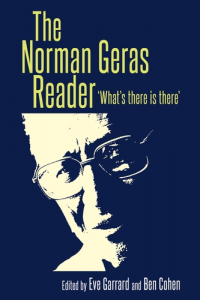 Norm died of cancer in October 2013. I have recently read The Norman Geras Reader – a great collection of some of his writings, which was published in 2017. The Reader also contains the text of the Euston Manifesto.
Norm died of cancer in October 2013. I have recently read The Norman Geras Reader – a great collection of some of his writings, which was published in 2017. The Reader also contains the text of the Euston Manifesto.
Everyone on the left would benefit from the Reader, especially the majority in the Labour Party who have come under the sway of a leader who is anti-West, who has joined in with promotors of terrorism, who has shared platforms with anti-Semites, and who remains equivocal about the right of Israel to exist.
The “What’s there is there” subtitle of the Reader in part refers to instances of anti-Semitism in Marx’s writing, which some Marxists choose to deny. Today it might also apply to another over-adored leader of our time.
Long before others, Norm rang alarm bells about these reactionary tendencies on the left. This remains one of the most important and prescient features of Norm’s writing. This is one of several reasons why he deserves to be remembered.
Marxism and liberalism
But despite our strong convergence over the Euston Manifesto, I found that in other respects Norm and I had diverged since we last met in the 1985.
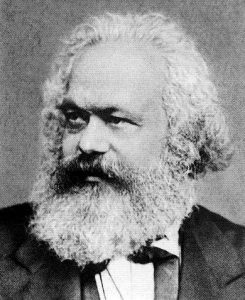
Karl Marx
Norm had moved politically in a liberal direction, but I had moved further. The Norman Geras Reader shows that Norm had remained a Marxist (of sorts) until his death. By contrast, I had departed from Marxism in about 1980 and set out on a decades-long journey from socialism to liberalism.
Despite his continuing adherence to Marxism, the Reader shows that Norm was strongly sympathetic to liberalism and he took its achievements very seriously.
For example, in a 1999 essay he argued that a “minimum utopia is to be conceived not only as socialist but also as liberal”. In 2012 he argued more forcefully:
“Unless … Marxists show themselves willing to engage fully with the intellectual resources of liberalism … unless a Marxist political theory comes to terms with the truths of liberal political theory, acknowledging the normative force of human rights, the idea of judicial independence and the separation of powers … insisting on free elections and an untrammelled freedom of speech and opinion, understanding the virtues of political pluralism … Marxism as a political movement might as well shut up shop.”
Bravo. But unlike Norm I agree with the closure of Marxist activity in the conclusion as well as with the preceding necessary conditions. Marxism cannot be liberal and it should shut up shop as a political movement. We can retain Marx’s more robust analytical insights, particularly on the nature and dynamics of capitalism.
But Marxist politics have been a disaster, and its dreadful and murderous consequences are not accidental. Marxism is incompatible with liberalism.
The politico-economic preconditions of liberalism
Norm rightly berated Stalin and other totalitarian Marxists. But are the disastrous consequences of Marxist regimes all down to bad people gaining positions of power? Surely it must be more than that? Why has every Marxist regime breached human rights, terminated free elections, curtailed freedom of speech and ended political pluralism?
To answer these questions we must look at the politico-economic conditions under which liberal-democratic states have been established and sustained. It is not just about the personalities of individuals.
There is a widespread opinion among non-Marxist social scientists that democracy requires countervailing political and economic power to have a chance of survival. In Marxist terms, if the economic “base” determines the “superstructure”, then a pluralist polity requires a pluralist (or mixed) economy, and not one that is encompassed by a massive state.
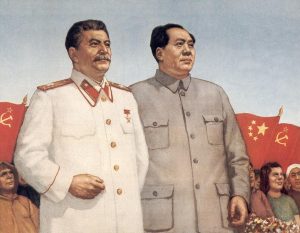 A complete concentration of political and economic power in the hands of the state, which Marx and Engels advocated with enthusiasm, always requires and enables a despotic political regime. There are no exceptions. The centralizing economic project within Marxism is incompatible with liberalism.
A complete concentration of political and economic power in the hands of the state, which Marx and Engels advocated with enthusiasm, always requires and enables a despotic political regime. There are no exceptions. The centralizing economic project within Marxism is incompatible with liberalism.
Accordingly, to prevent such a concentration of economic and hence political power in the hands of the state, there must be a private sector that is free to trade on markets.
Capitalism, socialism and greed
Norm disliked the greed and avarice that is often encouraged by capitalism. I do too. But I have learned that market economies come in many forms and are infused by different cultural precepts. A market economy does not necessarily mean a dog-eat-dog dystopia of greed and selfish individualism. As the Nordic examples illustrate, a better capitalism is possible. We need to build on their achievements and move still further in an egalitarian direction.
Furthermore, socialist bureaucracies can encourage selfishness, corruption and ruthless, power-seeking behaviour. Under real socialism these outcomes have typically been just as bad as those found within the worst of capitalisms.

A Worker Cooperative in New York City
Our understanding of human nature is relevant here, as Norm would have insisted. Over hundreds of thousands of years we have evolved to cooperate in small groups of no more than a hundred or so. This suggests that If socialism is to work, then it must be on a small scale.
Capitalism can also engender cooperation within autonomous firms, coordinated by markets. Some of these enterprises could be converted into worker cooperatives.
Class struggle and universal rights
There is a second reason why Marxism is incompatible with liberalism and with the principles in the Euston Manifesto. It concerns the issue of class struggle and proletarian dictatorship, about which Norm (at least in his Reader) had little to say.
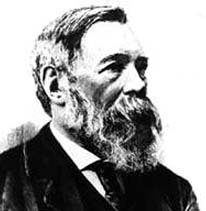
Frederick Engels
In Marxism, class struggle is both an analytic and a normative doctrine. It is about the working class seizing power and ending the rule of the capitalists. This doctrine means that the rights of one social class are privileged over another. Universal individual rights are no more. As Engels put it, the legal and individual rights of the Enlightenment are “nothing more than the idealized kingdom of the bourgeoisie.”
Any regime that denies rights to some, especially with malleable criteria concerning who is denied those rights, ends up denying rights to everyone. These are the consequences of Marx’s notion of class struggle and the “dictatorship of the proletariat”.
This is a clear totalitarian impulse. Marxist revolutionaries are deemed to know better what is in the interests of the working class than the working class itself. Democracy becomes an impediment to the realization of those true interests, about which the masses are not fully aware.
Conclusion: wrong turnings
Alas, Norm was silent in his writings about these problems (as far as I am aware) and I never had the chance to discuss them with him. I would have welcomed that.
The Euston Manifesto was a noble attempt to re-orient the left. Especially in the light of the Corbynista takeover of the Labour Party and the rise of anti-Semitism on the left, it should be re-read today. But sadly the Manifesto initiative was stillborn.
I wonder if one of the reasons for the failure of the Manifesto to keep up the momentum it briefly gained at its launch was the incomplete diagnosis by its promoters of where the left has gone wrong?
The Norman Geras Reader shows that the one leading Eustonite was still under the gravitational pull of Marxism, and reluctant to break from its power. (But Eustonite Alan Johnson took a different view on this important issue.) For whatever reason, The Euston Manifesto became a terminus, rather than the starting point of another journey.
Norm and I were both strong opponents the “anything goes” cultural relativism that overtook the left after the Vietnam War. Nick Cohen shows in his book What’s Left? that cultural relativism was one major wrong turning made by the left in its long evolution from the eighteenth century.
But another was the abandonment of universal human rights, when the influence of Marxism over the left became pre-eminent in the late nineteenth century. That wrong turning must also be recognized and reversed. That necessitates a break from Marxist politics, rather than promoting the unrealizable fantasy of a Marxist-liberal marriage.
We live in increasingly worrying times. We need another Manifesto that builds on Norm’s achievement but takes us still further toward the goal of a more egalitarian and humane society.
1 September 2018
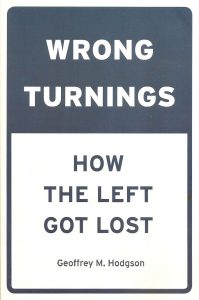
Bibliography
Camic, Charles and Hodgson, Geoffrey M. (eds) (2011) Essential Writings of Thorstein Veblen (London and New York: Routledge).
Cohen, Ben and Gerrard, Eve (eds) (2017) The Norman Geras Reader: ‘What’s There is There’ (Manchester: University of Manchester Press). See esp. pp. 56, 108.
Cohen, Nick (2007) What’s Left? How the Left Lost its Way (London and New York: Harper).
Geras, Norman (1983) Marx and Human Nature: Refutation of a Legend (London: Verso).
Hodgson, Geoffrey M. (1993) Economics and Evolution: Bringing Life Back Into Economics (Cambridge, UK and Ann Arbor, MI: Polity Press and University of Michigan Press).
Hodgson, Geoffrey M. (2013) From Pleasure Machines to Moral Communities: An Evolutionary Economics without Homo Economicus (Chicago: University of Chicago Press).
Hodgson, Geoffrey M. and Knudsen, Thorbjørn (2010) Darwin’s Conjecture: The Search for General Principles of Social and Economic Evolution (Chicago: University of Chicago Press).
Rich, Dave (2016) The Left’s Jewish Problem: Jeremy Corbyn, Israel and Anti-Semitism (London: Biteback).

 Norm’s 1983 book on Marx and Human Nature had a big impact on me. In the 1970s he had argued forcefully that the natural foundations of human existence had to be taken into account. The book refuted the fashionable misconception that Marx had denied the existence of a universal human nature.
Norm’s 1983 book on Marx and Human Nature had a big impact on me. In the 1970s he had argued forcefully that the natural foundations of human existence had to be taken into account. The book refuted the fashionable misconception that Marx had denied the existence of a universal human nature. Norm supported the US-led invasion in 2003. He argued that it was a humanitarian intervention to remove the vicious dictator Saddam Hussein.
Norm supported the US-led invasion in 2003. He argued that it was a humanitarian intervention to remove the vicious dictator Saddam Hussein.
 Norm died of cancer in October 2013. I have recently read The Norman Geras Reader – a great collection of some of his writings, which was published in 2017. The Reader also contains the text of the Euston Manifesto.
Norm died of cancer in October 2013. I have recently read The Norman Geras Reader – a great collection of some of his writings, which was published in 2017. The Reader also contains the text of the Euston Manifesto.
 A complete concentration of political and economic power in the hands of the state, which Marx and Engels advocated with enthusiasm, always requires and enables a despotic political regime. There are no exceptions. The centralizing economic project within Marxism is incompatible with liberalism.
A complete concentration of political and economic power in the hands of the state, which Marx and Engels advocated with enthusiasm, always requires and enables a despotic political regime. There are no exceptions. The centralizing economic project within Marxism is incompatible with liberalism.


This sounds a lot like Leszek Kolakowski’s “conservatism-liberalism-socialism” (as enumerated in his brief essay How to Be a Conservative Liberal-Socialist – the only difference being your refusal to call the socialist part of it socialism, as you seem to instinctively recoil from the entire word, to the extent of seeming to tacitly conflate it with Marxism. Which is a pity.
Socialism is widely defined (since Robert Owen) as common ownership of the means of production. All Marxists are socialists but not all socialists are Marxists. These are matters of historical fact.